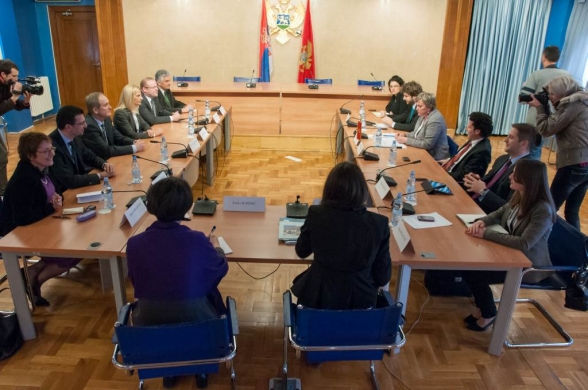The members of the Committee on European Integration met today with Ms Tanja Miščević, Head of Negotiating Team for Accession of the Republic of Serbia to the EU, as well as with the representatives of the negotiating structure of the Republic of Serbia.
The hosts informed the interlocutors on regular activities of the Committee on European Integration, to which almost all competencies in the negotiation area had been delegated. They also highlighted the adoption of the Resolution on Manner, Quality and Dynamics of the Integration Process of Montenegro to the European Union, which defined more clearly the role of the Committee with regard to the procedure of providing opinion on the draft negotiating positions. The topics in the meeting also included the segment of process transparency, in the sense of the need for continuous informing of the public on all news regarding the negotiation process. With that regard, they pointed out the positive practice of the Committee regarding organising of public debates, prior to consideration of draft negotiating positions at the meetings, as well as regarding the social network activity on networks such as “Facebook” and “Twitter”.
Ms Tanja Miščević, Head of Negotiating Team, pointed out that they were planning, taking their cue from the good practice of the countries that had already gone through this process, to adopt the model during the negotiating positions consideration stage by which they would include the civil sector in negotiations. She said that, in accordance with the new integration stage, in December, they adopted the Resolution on the role of the National Assembly and principles in the negotiations on the accession of the Republic of Serbia to the European Union, and that the experience of Montenegrin parliamentarians from this process had been exceptionally useful.
The interlocutors mutually pointed out the importance of involvement of all structures of society in the negotiation process, in order to reach quality idea solutions in the best possible manner for a more efficient, but also more effective, reaching of standards and fulfilling the set conditions. They concluded that the regional cooperation was the key to achieving visible progress, and that the negotiation process should be viewed as a common goal of all countries in the region, where the accession dynamics of one country would be an incentive to another country on its path towards the EU.









